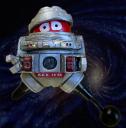…the person’s former faith has collapsed, but they do not yet have anything to replace it with. Unfortunately, most people are taught that only through religion can they hope to find happiness, meaning, purpose or fulfillment in life, and this belief often persists after all the other aspects of religious belief have gone, leading to a feeling of emptiness and hopelessness, of having hit rock bottom. Fear, undirected anger, and feelings of depression are common. Often a person feels overwhelmed and lost, adrift in the world without a framework to make sense of it all. (Into the Clear Air)
One day while I was flailing around for meaning in my life, I happened to be driving through northern Utah and southern Idaho on my way to a family reunion. The overcast skies and the long, scenic drive conspired to put me in a contemplative mood. I wondered why it mattered whether I lived or died since I would be dead in the end anyway. The universe didn’t care. It would go on its mindless way, heedless of my death.
Then I began to think about my daughters and my wife. My death would matter to them. I didn’t want them to be unhappy or to struggle without me. I wanted to help my family.
Then I thought about my ancestors, about all of the hard lives they eked out on this earth, about the flashes of joy and the dark tragedies in their lives. They survived and I owe my existence to their perseverance. I pondered on the countless generations of mankind who lived and died before me. A sense of deep history overcame me.
I imagined even further back to the time of my ape ancestors. I imagined the strength and tenderness of a maternal ancestor grooming her new baby, protecting it with her own life from the dangers lurking in the darkness. I imagined the strength and determination of my paternal ancestors whose lives punctuated by violence made me possible. I began to feel a sense of deep connection with all of my ancestors back to the beginning of life on earth.
Then I looked on the plants and animals around me and realized that I was surrounded by family, distant cousins trying to live according to the dictates of their own drives. I worried about the brutishness of their lives and wished I could lift them out of it. I was filled with compassion for all life.
I looked to the future. I saw obstacles and uncertainty. There was no God to help us. We could only succeed by our own wits, by taking responsibility into our own hands. Only we had the power to succor and bring equity. Only we could love each other.
I decided to live in the service of the grand experiment: life on earth. If I could ameliorate the suffering of other beings present and future, I would count my life meaningful. My heart burned within me with an intense love and connection with the world around me. I felt at peace; I had finally found a safe harbor to escape the storm. I felt an growing confidence that I was on the right path.
I had broken through to the other side.
Most people, by this stage, have learned that they are not alone, that their path is one that many travelers have walked before; that there are whole communities of freethinkers out there, glowing like galaxies through the dark veils of blind faith.… this stage is characterized by a peak as high as those valleys [of the previous stage] are deep, a joy as high and sublime as the horizon of dawn. The exhilaration of breaking through the layers of things that you believe because you have been taught to believe, of discovering for yourself what is true, and of finally knowing who you are and understanding your place in the cosmos, is something compared to which the sterile and antiquated dogmas of religion seem puny and absurd. Returning to them, at this stage, is like trying to return to life in a small, windowless room after one has seen the soaring, sunny vista that awaits just outside. (Ibid.)
Since that time, I’ve met a few believers who have had brushes with atheism. They come to the place of darkness and meaninglessness but never seem to make it through to the bright vistas on the other side. They’ve dipped their toes in the pool and decided that a world without God is not for them. Or perhaps they leapt in and began to drown like I had. While I found the other side of the pool to save me, they returned to the place from which they dove in.
They have to find their own way and happiness, but I wish I could share with them what I found.
]]>